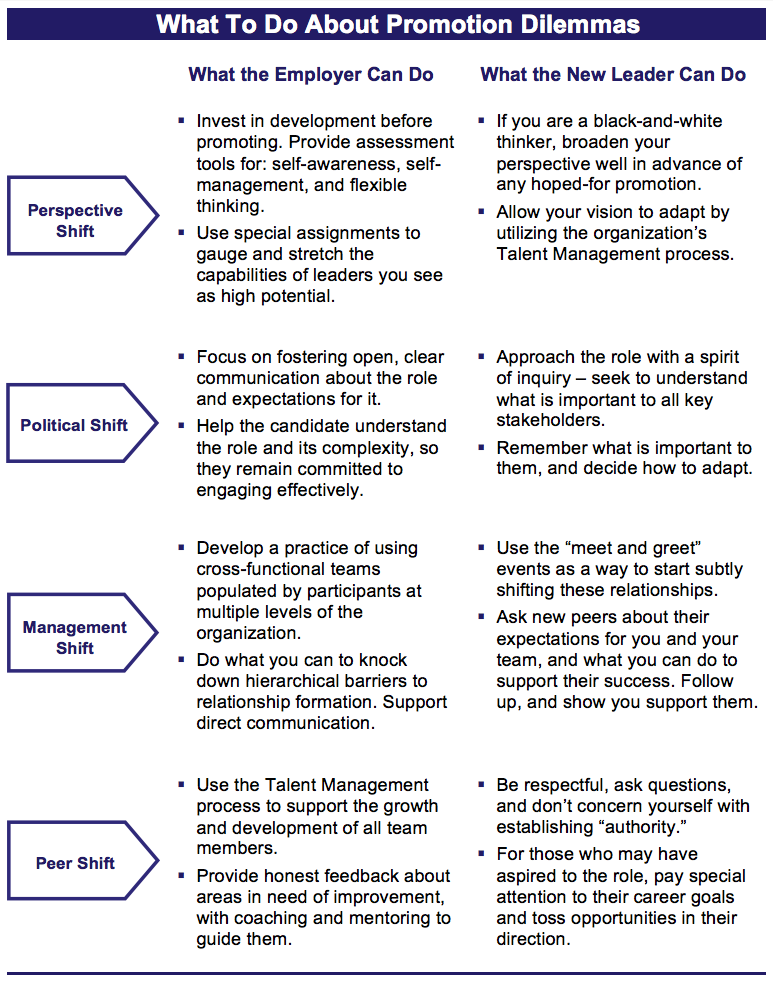 You’ve worked hard, paid your dues, and earned a promotion. Enjoy the moment and celebrate your success. Then take time to recognize that some barriers and surprises may await you. Never fear – these challenges can be overcome, if you can identify and properly prepare for them.
You’ve worked hard, paid your dues, and earned a promotion. Enjoy the moment and celebrate your success. Then take time to recognize that some barriers and surprises may await you. Never fear – these challenges can be overcome, if you can identify and properly prepare for them.Certainly you never expected this transition to be easy, but you also hoped that your extensive knowledge of the organization, your determination and previous wins would position you for success. In fact, you were told that is why you were selected. These are important things to bring to a new role, but as you advance in the company, so do complications that can derail New Leaders.
The 4 Shifts that Create Dilemmas in Promotions
When organizations elevate existing employees, they need to prepare their New Leaders for higher-level roles. Unfortunately, many promoted leaders are not adequately equipped for the dilemmas they will face when entering their new positions. In our experience with clients, we have noticed the presence of 4 shifts that internally promoted New Leaders are likely to experience.
- Perspective shift: The view from the executive floor is dramatically different. The New Leader may have moved from a structured, “black and white” role into a position fraught with ambiguity and “grey areas.”
- Political shift: The political landscape for newly promoted leaders is often completely different, and it takes on elevated importance. They may feel like they’re working for an entirely new organization. Navigating this unfamiliar terrain can expose a number of pitfalls.
- Managment shift: Former Manager(s) and their colleagues become peers, and they may view the New Leader under an old lens. A New Leader’s success depends on their acceptance, which may not be easily gained.
- Peer shift: Former peers become direct reports, and some may be unhappy about this change (especially those who were also considered for the role). These team members can make or break the New Leader, and they may not be overt about their displeasure.
By following the approaches suggested above, both the New Leader and the organization can work together to create a smoother and more effective promotion. And it will remind their colleagues exactly why they won the role in the first place.
(Photo: ©fergregory/123RF.com)
Our Blog
- To Lead or Not to Lead? A Skilled Project Manager Weighs In
- Why Do We Perpetuate the Myth of New Leader “Fit”?
- Until Success Do We Part: How to Decide If a Project Management Role is For You
- Starting the Journey: A New Project Manager’s Guide to Implementation
- The Myth of the Flawless Outsider
- Culture Makes or Breaks New Leaders
- New to Your Job? Don’t Let Your Rival(s) Drag You Under
- The OnBoarding Paradox: How New Leaders Prevail
- New Leader Failure: A Problem or A Symptom?
- What Surprises Await? The 4 Dilemmas that Can Derail Newly Promoted Leaders
- Why New Leaders “Don’t Get It” And What To Do About It
- The Credibility Trap
- Don’t Forget to Add Relationships to Your “To Do” List
- OnBoarding as Risk Management
- Managing Change: How to Include the Team and Gain Support
- The #1 “Killer” of New Leaders: Failure to Achieve and Maintain Role Clarity
- New Leaders: How Does Your MBTI Profile Influence Your Transition?
- E vs. I: How Does Your MBTI Preference Influence Your Transition?
- S vs. N: How Does Your MBTI Preference Influence Your Transition?
- T vs. F: How Does Your MBTI Profile Influence Your Transition?
- J vs. P: How Does Your MBTI Profile Influence Your Transition?
- Identifying Your Rival(s): It’s Not Who You Think It is …
- Rivals Part 2: Bringing Them into The Fold
- Your New Team: Sizing Up, Investing In, or Trading Out
- The Importance of Feedback – Early and Ongoing
- Don’t Underestimate the Importance of the Personal Transition
- OnBoarding and the Importance of Early Impressions – Part 1
- Early Impressions — Part 2: Containing and Repairing Missteps

